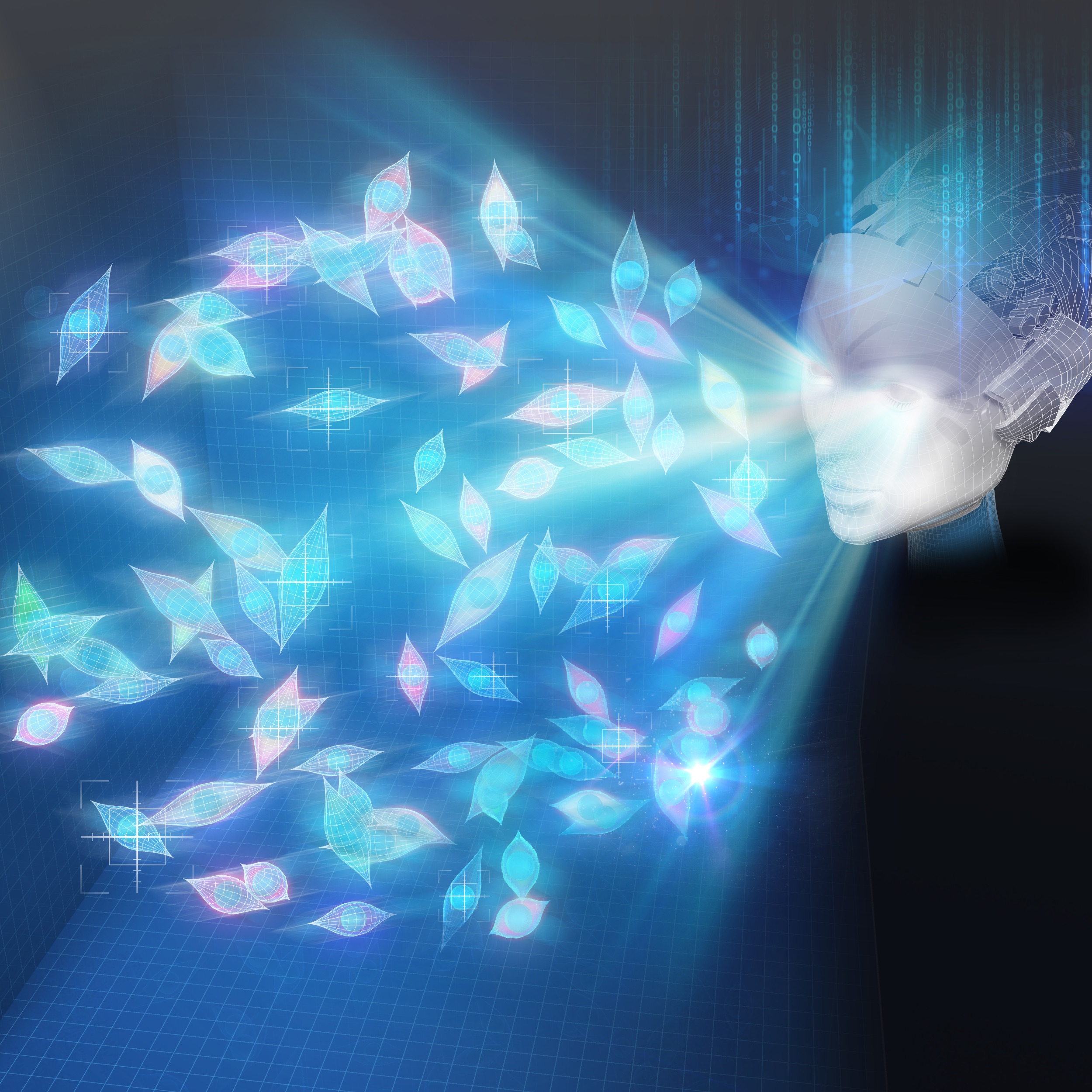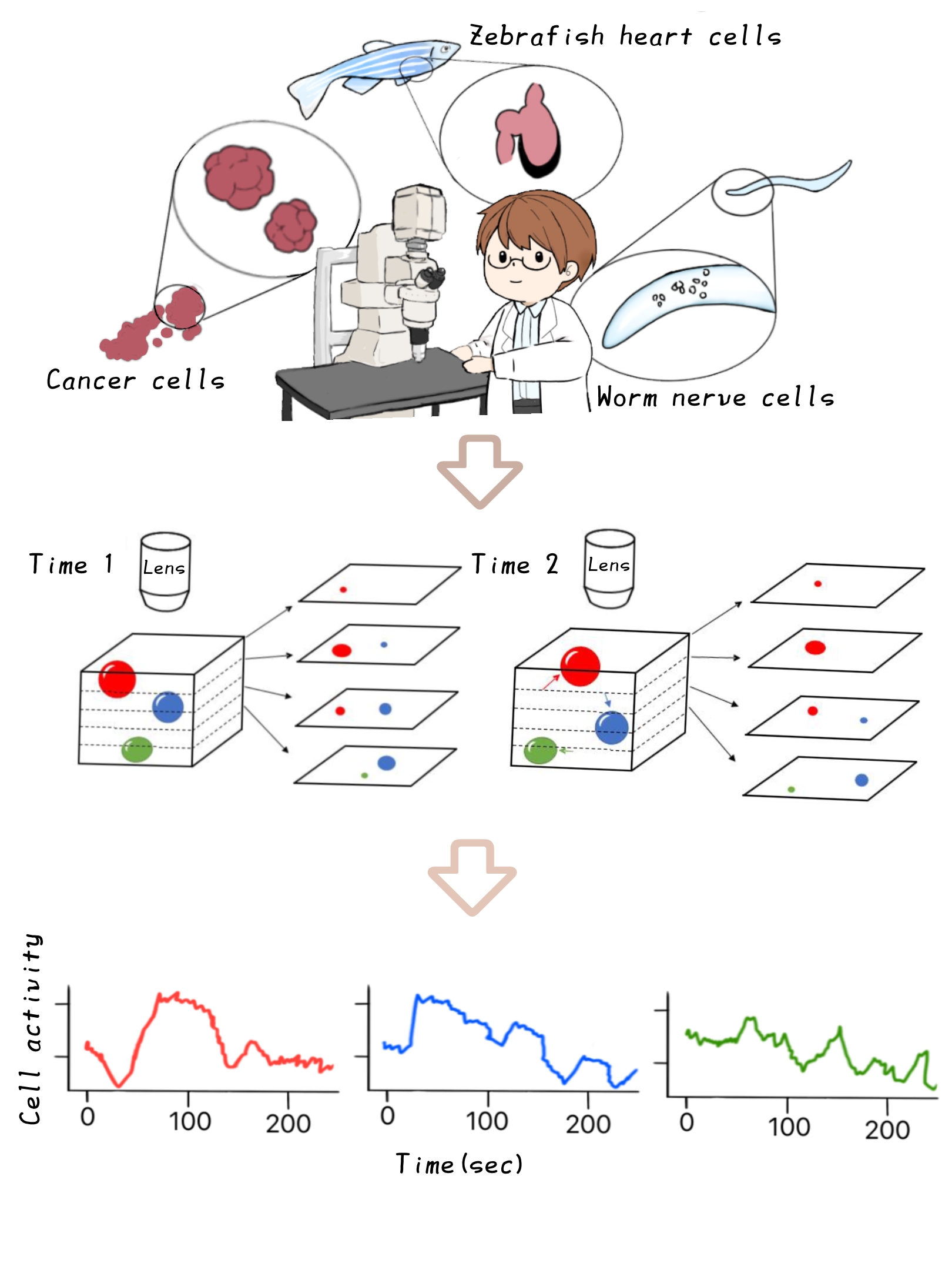New AI-based versatile software for tracking many cells in 3D microscopevideos
March 24,2021
subtitle
Automatic tracking of cells in microscope videos will contribute to basic life science research and drugdiscovery by easily analyzing critical cellular activities.
summary
The first deep-learning software was developed as a versatile tool for tracking cells and extracting their signalsfrom ~100 cells in a moving worm brain, in a zebrafish heart, and ~1,000 cultured cancer cells in 3Dmicroscope videos. The method demonstrates significant improvements in tracking capabilities on variousmetrics including the possible number of tracked objects, robustness, and computing requirements.
Full Text
In modern basic life science research as well as in drug discovery, recording and analyzing the images of cellsover time using 3D microscopy has become extremely important. Once the images have been recorded, thesame cell in different images at different time points has to be accurately identified ("cell tracking") because theliving cells captured in the images are in motion. However, tracking many cells automatically in 3D microscopevideos has been considerably difficult. In the Kimura laboratory at the Nagoya City University, Dr. ChentaoWen and colleagues developed the 1st AI-based software called 3DeeCellTracker that can run on a desktopPC and automatically track cells in 3D microscope videos. Using the software, they were able to measure andanalyze the activities of ~100 cells in the brain of a moving microscopic worm, in a naturally beating heart of ayoung small fish, and ~1000 cancer cells cultured in 3D under laboratory conditions, which were recorded withdifferent types of cutting-edge microscope systems. This versatile software can now be used across biology,medical research, and drug development to help monitor cell activities.
Cell tracking in 3D space by AI
subtitle
Automatic tracking of cells in microscope videos will contribute to basic life science research and drugdiscovery by easily analyzing critical cellular activities.
summary
The first deep-learning software was developed as a versatile tool for tracking cells and extracting their signalsfrom ~100 cells in a moving worm brain, in a zebrafish heart, and ~1,000 cultured cancer cells in 3Dmicroscope videos. The method demonstrates significant improvements in tracking capabilities on variousmetrics including the possible number of tracked objects, robustness, and computing requirements.
Full Text
In modern basic life science research as well as in drug discovery, recording and analyzing the images of cellsover time using 3D microscopy has become extremely important. Once the images have been recorded, thesame cell in different images at different time points has to be accurately identified ("cell tracking") because theliving cells captured in the images are in motion. However, tracking many cells automatically in 3D microscopevideos has been considerably difficult. In the Kimura laboratory at the Nagoya City University, Dr. ChentaoWen and colleagues developed the 1st AI-based software called 3DeeCellTracker that can run on a desktopPC and automatically track cells in 3D microscope videos. Using the software, they were able to measure andanalyze the activities of ~100 cells in the brain of a moving microscopic worm, in a naturally beating heart of ayoung small fish, and ~1000 cancer cells cultured in 3D under laboratory conditions, which were recorded withdifferent types of cutting-edge microscope systems. This versatile software can now be used across biology,medical research, and drug development to help monitor cell activities.
Cell tracking in 3D space by AI

Workflow of the method
Cells of various organisms are recorded as 3D videos with state-of-the-art microscope systems (top), the cellsin 3D videos obtained are automatically tracked by the AI technology (middle), and the activity of each cell ismeasured and analyzed (bottom).
Cells of various organisms are recorded as 3D videos with state-of-the-art microscope systems (top), the cellsin 3D videos obtained are automatically tracked by the AI technology (middle), and the activity of each cell ismeasured and analyzed (bottom).

| Title | New AI-based versatile software for tracking many cells in 3D microscopevideos |
| Author | Chentao Wen(corresponding author), Takuya Miura, VenkatakaushikVoleti, Kazushi Yamaguchi, Motosuke Tsutsumi, Kei Yamamoto, KoheiOtomo, Yukako Fujie, Takayuki Teramoto, Takeshi Ishihara, KazuhiroAoki, Tomomi Nemoto, Elizabeth M.C. Hillman, Koutarou D. Kimura |
| Researcher URL | https://en.kokimura-lab.org/ |


